初中英语点动词和延续性动词练习题
短暂动词和延续性动词练习题
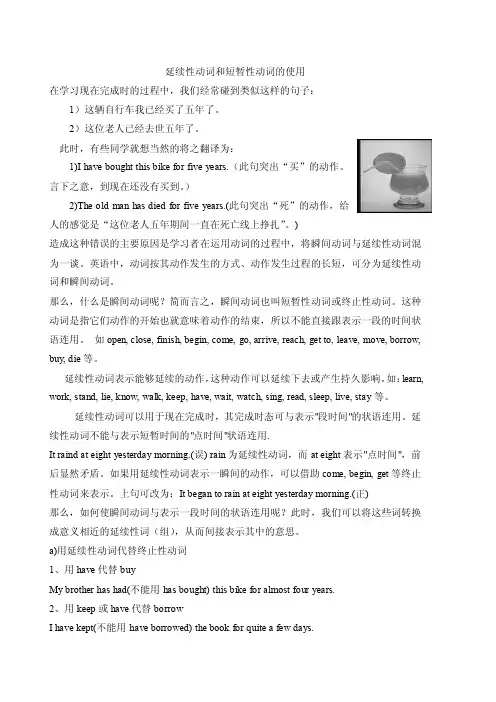
延续性动词和短暂性动词的使用在学习现在完成时的过程中,我们经常碰到类似这样的句子:1)这辆自行车我已经买了五年了。
2)这位老人已经去世五年了。
此时,有些同学就想当然的将之翻译为:1)I have bought this bike for five years.(此句突出“买”的动作。
言下之意,到现在还没有买到。
)2)The old man has died for five years.(此句突出“死”的动作,给人的感觉是“这位老人五年期间一直在死亡线上挣扎”。
)造成这种错误的主要原因是学习者在运用动词的过程中,将瞬间动词与延续性动词混为一谈。
英语中,动词按其动作发生的方式、动作发生过程的长短,可分为延续性动词和瞬间动词。
那么,什么是瞬间动词呢?简而言之,瞬间动词也叫短暂性动词或终止性动词。
这种动词是指它们动作的开始也就意味着动作的结束,所以不能直接跟表示一段的时间状语连用。
如open, close, finish, begin, come, go, arrive, reach, get to, leave, move, borrow, buy, die等。
延续性动词表示能够延续的动作,这种动作可以延续下去或产生持久影响。
如:learn, work, stand, lie, know, walk, keep, have, wait, watch, sing, read, sleep, live, stay等。
延续性动词可以用于现在完成时,其完成时态可与表示"段时间"的状语连用。
延续性动词不能与表示短暂时间的"点时间"状语连用.It raind at eight yesterday morning.(误) rain为延续性动词,而at eight表示"点时间",前后显然矛盾。
如果用延续性动词表示一瞬间的动作,可以借助come, begin, get等终止性动词来表示。
初中英语动词练习题及解析
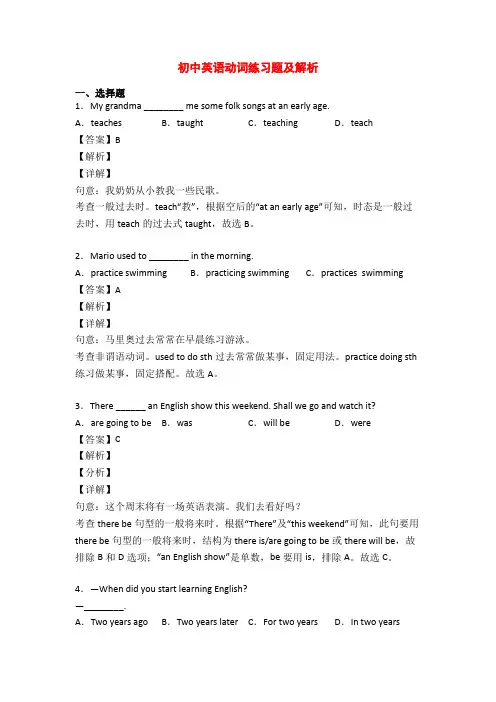
初中英语动词练习题及解析一、选择题1.My grandma ________ me some folk songs at an early age.A.teaches B.taught C.teaching D.teach【答案】B【解析】【详解】句意:我奶奶从小教我一些民歌。
考查一般过去时。
teach“教”,根据空后的“at an early age”可知,时态是一般过去时,用teach的过去式taught,故选B。
2.Mario used to ________ in the morning.A.practice swimming B.practicing swimming C.practices swimming 【答案】A【解析】【详解】句意:马里奥过去常常在早晨练习游泳。
考查非谓语动词。
used to do sth过去常常做某事,固定用法。
practice doing sth 练习做某事,固定搭配。
故选A。
3.There ______ an English show this weekend. Shall we go and watch it?A.are going to be B.was C.will be D.were【答案】C【解析】【分析】【详解】句意:这个周末将有一场英语表演。
我们去看好吗?考查there be句型的一般将来时。
根据“There”及“this weekend”可知,此句要用there be句型的一般将来时,结构为there is/are going to be或there will be,故排除B和D选项;“an English show”是单数,be要用is,排除A。
故选C。
4.—When did you start learning English?—________.A.Two years ago B.Two years later C.For two years D.In two years【解析】【详解】句意:——你什么时候开始学英语的?——两年前。
(英语)中考英语动词基本形式练习题及答案及解析
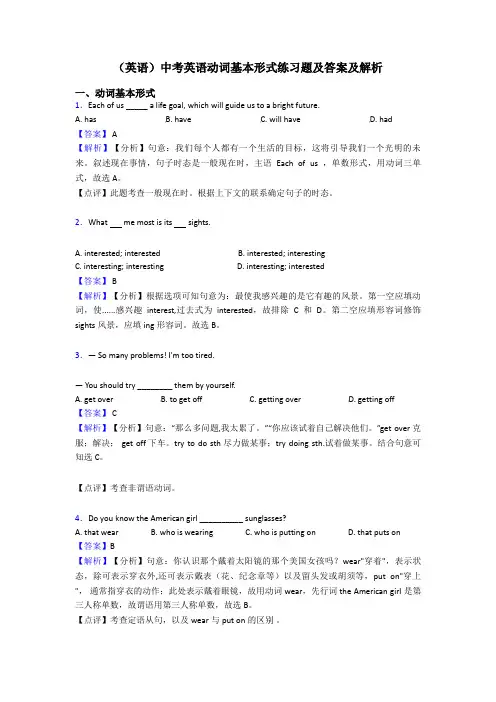
(英语)中考英语动词基本形式练习题及答案及解析一、动词基本形式1.Each of us _____ a life goal, which will guide us to a bright future.A. hasB. haveC. will haveD. had【答案】 A【解析】【分析】句意:我们每个人都有一个生活的目标,这将引导我们一个光明的未来。
叙述现在事情,句子时态是一般现在时,主语Each of us ,单数形式,用动词三单式,故选A。
【点评】此题考查一般现在时。
根据上下文的联系确定句子的时态。
2.What me most is its sights.A. interested; interestedB. interested; interestingC. interesting; interestingD. interesting; interested【答案】 B【解析】【分析】根据选项可知句意为:最使我感兴趣的是它有趣的风景。
第一空应填动词,使......感兴趣interest,过去式为interested,故排除C和D。
第二空应填形容词修饰sights风景,应填ing形容词。
故选B。
3.— So many problems! I'm too tired.— You should try ________ them by yourself.A. get overB. to get offC. getting overD. getting off【答案】 C【解析】【分析】句意:“那么多问题,我太累了。
”“你应该试着自己解决他们。
”get over克服;解决;get off下车。
try to do sth尽力做某事;try doing sth.试着做某事。
结合句意可知选C。
【点评】考查非谓语动词。
4.Do you know the American girl __________ sunglasses?A. that wearB. who is wearingC. who is putting onD. that puts on【答案】B【解析】【分析】句意:你认识那个戴着太阳镜的那个美国女孩吗?wear"穿着",表示状态,除可表示穿衣外,还可表示戴表(花、纪念章等)以及留头发或胡须等,put on"穿上",通常指穿衣的动作;此处表示戴着眼镜,故用动词wear,先行词the American girl是第三人称单数,故谓语用第三人称单数,故选B。
2023年中考英语语法---动词及动词短语专题复习及练习题(含答案)
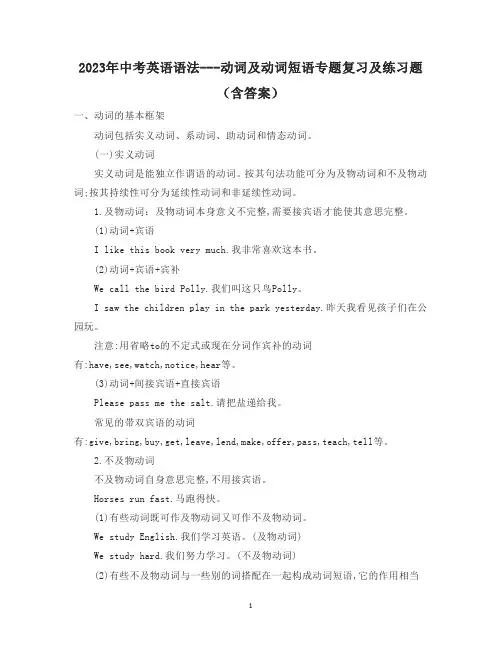
2023年中考英语语法---动词及动词短语专题复习及练习题(含答案)一、动词的基本框架动词包括实义动词、系动词、助动词和情态动词。
(一)实义动词实义动词是能独立作谓语的动词。
按其句法功能可分为及物动词和不及物动词;按其持续性可分为延续性动词和非延续性动词。
1.及物动词:及物动词本身意义不完整,需要接宾语才能使其意思完整。
(1)动词+宾语I like this book very much.我非常喜欢这本书。
(2)动词+宾语+宾补We call the bird Polly.我们叫这只鸟Polly。
I saw the children play in the park yesterday.昨天我看见孩子们在公园玩。
注意:用省略to的不定式或现在分词作宾补的动词有:have,see,watch,notice,hear等。
(3)动词+间接宾语+直接宾语Please pass me the salt.请把盐递给我。
常见的带双宾语的动词有:give,bring,buy,get,leave,lend,make,offer,pass,teach,tell等。
2.不及物动词不及物动词自身意思完整,不用接宾语。
Horses run fast.马跑得快。
(1)有些动词既可作及物动词又可作不及物动词。
We study English.我们学习英语。
(及物动词)We study hard.我们努力学习。
(不及物动词)(2)有些不及物动词与一些别的词搭配在一起构成动词短语,它的作用相当于一个及物动词。
①动词+介词Listen to the teacher carefully.仔细听老师讲。
此类动词短语后面的宾语无论是名词还是代词,都只能放在介词后面,不能放在动词和介词之间。
②动词+副词+介词Let’s go on with our work!让我们继续我们的工作吧!He gets along well with his classmates.他与他的同学们相处得很好。
整理仁爱英语七、八年级动词及练习
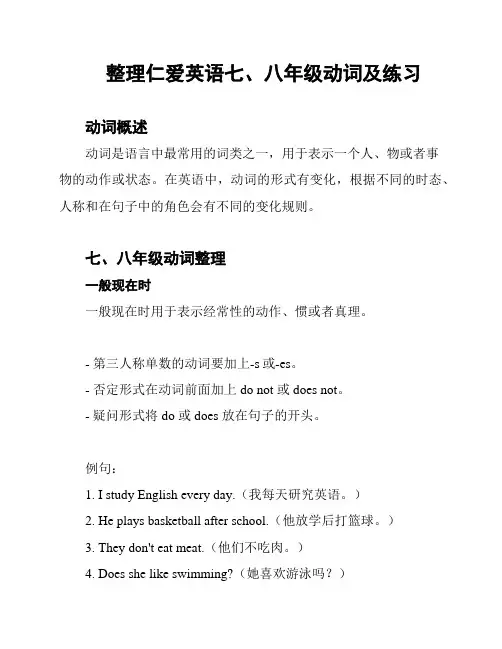
整理仁爱英语七、八年级动词及练习动词概述动词是语言中最常用的词类之一,用于表示一个人、物或者事物的动作或状态。
在英语中,动词的形式有变化,根据不同的时态、人称和在句子中的角色会有不同的变化规则。
七、八年级动词整理一般现在时一般现在时用于表示经常性的动作、惯或者真理。
- 第三人称单数的动词要加上-s或-es。
- 否定形式在动词前面加上 do not 或 does not。
- 疑问形式将 do 或 does 放在句子的开头。
例句:1. I study English every day.(我每天研究英语。
)2. He plays basketball after school.(他放学后打篮球。
)3. They don't eat meat.(他们不吃肉。
)4. Does she like swimming?(她喜欢游泳吗?)现在进行时现在进行时用于表示现在进行的动作或情况。
- 动词用-ing 结尾。
- 现在进行时由助动词 be 和动词的现在分词构成。
例句:1. She is reading a book now.(她正在看书。
)2. They are playing soccer in the park.(他们正在公园里踢足球。
)一般过去时一般过去时用于表示过去某个时间发生的动作或情况。
- 动词过去式的构成有规律和不规律两种。
- 一般过去时由动词的过去式构成。
例句:1. I watched a movie last night.(昨晚我看了一场电影。
)2. She studied English when she was in high school.(她上高中时研究英语。
)过去进行时过去进行时用于表示过去某个时间正在进行的动作或情况。
- 动词用-ing 结尾。
- 过去进行时由助动词 was/were 和动词的现在分词构成。
例句:1. They were playing games at that time.(那个时候他们正在玩游戏。
初三英语动词专题及专项练习(含答案)
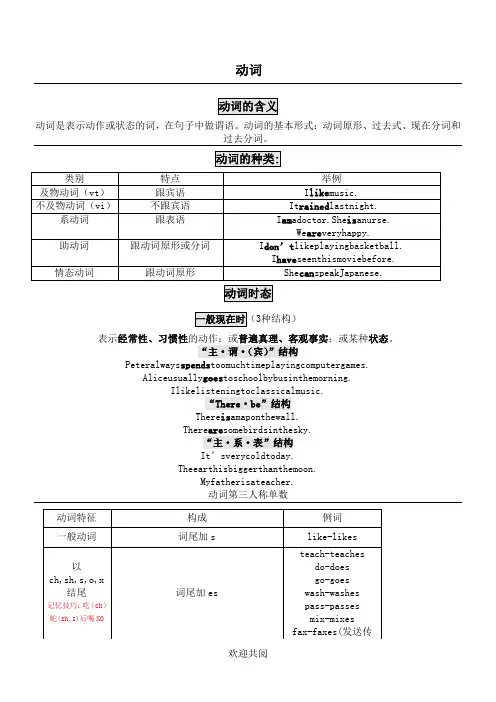
动词动词是表示动作或状态的词,在句子中做谓语。
动词的基本形式:动词原形、过去式、现在分词和过去分词。
3种结构)表示发生在过去的动作。
在一般过去时的句子中,动词必须用过去式.表示目前正在发生或进行的动作。
(只有延续性动词有进行时;非延续性动词没有进行时)主语+系动词(am/is/are )+现在分词Look.Alice is readingamagazineoverthere.Listen.PeterissingingaChinesesong.AliceistalkingtoPeter now.I’mlearningJapanese atthemoment.特殊情况:非延续性动词没有进行时,它们的现在分词形式表示将来时。
主语+(am/is/are)+非延续性动词的现在分词:表示将来时。
I’m going toschoolnow.Maryis leavingfor NewYorksoon.SpringFestivalis coming.I’m arriving inBeijing.“begoingto+动词原形”与“will+动词原形”begoingto和will在一般情况下可以互换,但是在下列情况下将来时要用will。
延续性动词可以接一段时间;非延续性动词后面不能接一段时间,如果要接一段时间,就必须把非延续性动词替换成相应的延续性动词.come--behere Hecameheretwohoursago.Hehas been herefortwohours.go--beout/beaway Theywentoutanhourago.Theyhave been outforanhour.leave---beaway Tomlefttenminutesago.Tomhas been awayfortenminutes.buy---have Iboughtthisdictionary10yearsago.Ihavehadthisdictionaryfor10years.begin---beon Thefilmbeganfiveminutesago.Thefilmhasbeenonforfiveminutes.某些延续性动词(如:lookfor,watch,waitfor,live,work,develop,teach,learn,study,rain等)与since或for连用时,表示“从过去的某一时刻起,一直持续到现在的动作”,它们的“现在完成时”可以与“现在完成进行时”互相替换。
初中英语动词的时态试题(有答案和解析)及解析
一、初中英语动词的时态
1.This medicine _______ millions of people’s lives since it was put into use.
A.is savingB.will saveC.has savedD.had saved
【答案】B
【解析】
句意:当我在伦敦时,我参观了几个博物馆。A. visit参观,用于一般现在时态,主语复数时;B. visited参观,用于一般过去时态;C. have visited参观,用于一般现在完成时态;D. are visiting参观,用于现在进行时态,主语复数时;根据while we were in London.可知主句用过去时态;故选B
—I was taking a shower at that time.
A.callB.called
C.am callingD.have called
【答案】B
【解析】
句意:——我七点钟打电话给你,你没接。——那时我正在洗澡。考查动词时态辨析题。and连接并列结构,at seven在七点钟,是过去的时间,需用一般过去时,可排除ACD三项。根据句意语境,可知选B。
They aren't having a meeting now.他们现在没有在开会。
Are they having a meeting now?他们现在正在开会吗?
What are theI ________ you at seven and you didn’t pick up.
10.---Did you watch the program The Voice last night?
---I wanted to, but my mother __________her favorite TV play.
初中英语动词专项训练及答案及解析
初中英语动词专项训练及答案及解析一、选择题1.So far we ________ five hundred English words.A.learn B.have learned C.learned D.learns【答案】B【解析】【详解】句意:到目前为止,我们已经学了500个英语单词。
考查现在完成时。
根据“So far”可知,此处使用现在完成时,结构为“have/has done”,主语为we,因此是have done。
故选B。
2.—I phoned you at six yesterday evening, but nobody answered.—I ________ basketball with my friends.A.am playing B.was playing C.played D.will play【答案】B【解析】【分析】【详解】句意:——我昨天晚上六点钟给你打电话,但是没有人接。
——我在和朋友们打篮球。
考查过去进行时。
根据“I...basketball with my friends.”可知,此处强调在过去的某个时间点,正在发生的动作,用过去进行时,故选B。
3.The school sports meeting will ________ next week. We are looking forward to it. A.take off B.take place C.take action【答案】B【解析】【分析】【详解】句意:学校运动会将于下周举行。
我们正期待着。
考查短语辨析。
take off脱下;take place发生;take action采取措施。
根据“The school sports meeting”可知,应该是举行运动会,结合选项,“take place”符合句意。
故选B。
4.There ________ a sports meeting in our school next Friday.A.is going to have B.will have C.is going to be D.is【答案】C【解析】【详解】句意:下星期五我们学校将举行一场运动会。
延续性动词与非延续性动词总结(含练习)
延续性动词与非延续性动词动词按其动作发生的方式、发生过程的长短可分为延续性动词与非延续性动词。
一.延续性动词表示能够延续的动作,如:study, learn, work, stand, lie, know, walk, keep, have, wait, watch, sing, read, sleep, live, stay等。
延续性动词可以与表示时间段的状语连用。
延续性动词的用法很广,常见于现在完成时中的句子中,且常与for,how,long,since等引导的表示一段时间的状语或状语从句连用。
表示时间段的短语有:1.for+一段时间, eg: for 2 years; for a long time等从句,since he came here;3.since+时间点名词+ago, eg:since last year, since 5 days ago;4. how long;二.非延续性动词也称终止性动词、瞬间动词或点动词,表示不能延续的动作,这种动作发生后立即结束。
如:open, die, close, begin, finish, come, go, move, borrow, lend, buy, move, happen, marry, arrive/reach, post, fall, break, lose, give,常见的这类动词有:go, come, leave, arrive, lose, land, catch, join, kill, find 等。
例如:1. He has joined the club for a long time. ( 错)2. He has been a member of the club for a long time. ( 对)3. His grandfather has died for over 30 years. ( 错)4. His grandfather has been dead for over 30 years. ( 对)【注意】之所以将这些动词称为瞬间动词,是因为这些动词在眨眼之间发生并终结。
初中英语动词专项训练及答案及解析
初中英语动词专项训练及答案及解析一、选择题1.—Kitty, I’m busy cooking. Can you give me a hand?—Mom, just wait a moment. I ________ my bed now.A.make B.makes C.am making D.making【答案】C【解析】【详解】句意:——基蒂,我正忙着做饭。
你能帮我一下吗?——妈妈,等一下。
我正在整理我的床。
考查动词时态。
根据时间状语“now”,可知空处所在句子用现在进行时,其构成为“be+动词-ing”。
故选C。
2.— Do you know Lydia very well?— Sure. We ________ friends since we were very young.A.became B.were C.have been【答案】C【解析】【详解】句意:——你非常了解Lydia吗?——当然。
我们从小就是朋友。
考查动词时态。
since+一般过去时的句子,主句用现在完成时have/has done的结构,故选C。
3.—Dreams under the Willow is very interesting.—I agree with you. I ________ it twice.A.am reading B.was reading C.have read【答案】C【解析】【分析】【详解】句意:——《柳树下的梦》很有趣。
——我同意你的看法。
我已经读了两遍。
考查动词时态。
根据“twice”可知,句子应用现在完成时,表示已经读了两遍,结构为have/has done。
故选C。
4.If it rains tomorrow, we ________ at home.A.stayed B.stay C.were staying D.will stay【答案】D【解析】【详解】句意:如果明天下雨,我们就待在家里。
- 1、下载文档前请自行甄别文档内容的完整性,平台不提供额外的编辑、内容补充、找答案等附加服务。
- 2、"仅部分预览"的文档,不可在线预览部分如存在完整性等问题,可反馈申请退款(可完整预览的文档不适用该条件!)。
- 3、如文档侵犯您的权益,请联系客服反馈,我们会尽快为您处理(人工客服工作时间:9:00-18:30)。
初中英语点动词和延续性动词练习题1) He got to Beijing five minutes ago. He ________ _________ _________ Beijing for _________ _________.2) I moved to the USA last year. I ________ ________ __________ the USA since __________ __________.3) I went home yesterday. I _______ ________ _________ home for _________ __________.4) They came here last week. They _________ _________ here since _________ __________.5) He came out two years ago. He _________ __________ _________ for __________ __________.6) We return to Fuzhou yesterday. We ________ ________ _________ to Fuzhou since __________.7) I became a teacher in 2000. I ________ __________ a teacher for _________ _________.8) The river became dirty last year. The river _________ _________ dirty for _________ __________.9) The shop closed two hours ago. The shop ________ _________ _________ for _________ _________.10) The door opened at six in the morning. The door ________ ________ ________ for six hours.11) I got up two hours ago. I ________ ________ ________ since ________ ________ _________.12) He left Fuzhou just now. He _______ ________ ________ _________ Fuzhou for five minutes.13) My grandpa died in 2002. My grandpa _______ _______ ________for _______ ________.14) The meeting finished at six. The meeting ________ ______ ______ for six hours.15) I got to sleep two hours ago. I ________ _________ _________ since _________ __________ _________.16) They married in 1990. They ________ _________ __________since _________.17) I began to teach at this school in 1995. I ____ ____ at this school since ____.18) The film began two minutes ago. The film ____ ____ ____ for ____ ____.19) They borrowed it last week. They _________ _________ it since __________ __________.20) I bought a pen two hours ago. I _________ _________ a pen for ________ __________.21) I got to know him last year. I _________ __________ him since __________ __________.22) I put on my glasses three years ago. I __________ __________ my glasses for _________ _________.23) He has gone to Beijing. He ____ ____ _____ Beijing for two days.时态和语态( ) 1. Don’t make so much noise. We _______ to the music. A. listened B. listen C. are listening D. have listened ( ) 2. I must return the camera to Li Lei. I _______ it for two weeks. A. keep B. borrowed C. have kept D. have lent ( ) 3. –When will you tell him the good news? --I will tell him about it as soon as he _______ back.A. comesB. cameC. will comeD. is coming( ) 4. –Dad, please open the door, it _______. –OK, dear. I’m coming. A. locks B. locked C. is locked D. was locked ( ) 5. –Did you go to Jim’s birthday par ty? --No, I _______.A. am not invitedB. wasn’t invitedC. haven’t invitedD. didn’t invite( ) 6. A talk on Chinese history _______ in the school hall next week.A. be givenB. has been givenC. will be givenD. will give( ) 7. You may go fishing if your work _______. A. is done B. will be done C. has done D. have done ( ) 8. –What do you think of the football match yesterday? --Well. It’s surprising. The strongest team of our school _______.A. was beatenB. wonC. scoredD. was failed( ) 9. –Would your younger brother go for a picnic this Sunday? --If I don’t go, _______.A. so does heB. so he willC. neither will heD. neither does he( ) 10. The trees must _______ three times a week. A. water B. is watering C. be watered D. waters ( ) 11. –Did you see Tom at the party? -- No, he _______ by the time I got there.A. leftB. was leavingC. had leftD. has left( ) 12. –Why not go to see the dolphin show with me? --Because I ______ it. A. saw B. will see C. see D. have seen ( ) 13. –Do you like watching cooking programs on TV?--No, I don’t, but my twin brother _______. He’s very f ond of cooking. A. does B. do C. is D. are( ) 14. Catherin _______ the letter before her mother came into her bedroom.A. has writtenB. was writtenC. had writtenD. is writing( ) 15. The old man is quite weak after the accident, so he _______.A. must take care ofB. must be take care ofC. must look afterD. must be looked after( ) 16. The ticket is on the floor. Would you please _______ for me?A. pick it upB. pick up itC. pick up themD. pick them up( ) 17. He _______ living in the country to the city. A. likes B. prefers C. enjoys D. loves( ) 18. How long have you _______ the book? A. bought B. lent C. had D. borrowed( ) 19. –Do you know him well ? --Sure. We _______ friend since ten years ago.A. wereB. have beenC. have becomeD. have made( ) 20. _______ me carefully, boys and girls. Can you _______ me?A. Listen to; hearB. Hear; listen toC. Hear; hearD. Listen to; hear from( ) 21. –These farmers have been to the United States. –Really? When ______ there?A. will they goB. did they goC. do they goD. have they gone( ) 22. I’m sorry I haven’t got any money. I _______ my handbag at home.A. have missedB. have leftC. have putD. have forgotten( ) 23. –Where is Miss Gao. Lily? --She _______ to the teachers’. A. has been B. has gone C. went D. would go ( ) 24. When her father came back home, Joan _______ with her friend. A. talked B. talks C. is talking D. was talking ( ) 25. –What’s tha t thing with three legs? --It’s a cup. It ______ for drinking in the old days.A. usesB. usedC. is usedD. was used( ) 26. His uncle _______ in three days. A. returns B. has returned C. returned D. will return( ) 27. –Hi, Lin Tao. I didn’t see you at the party. -Oh, I _______ ready for the maths exam.A. am gettingB. was gettingC. gotD. have got( ) 28. –Excuse me. What did you say you would like to do, Miss White?--I said I’d better go back to the office. I _______ something this afternoon.A. would meetB. meetC. am going to meetD. was meeting( ) 29. What _______ the forest in our country in the last ten years.A. has happened doB. is happened toC. has happened atD. is happening( ) 30. –What did Mr Jones do before he moved here? --He _______ a city bus for over twenty-five years.A. is drivingB. droveC. has drivenD. drives( ) 31. –When _______ you _______ your homework? --I had finished it before he _______ back.A. have; finished; cameB. have; finished; was comingC. did; finish; cameD. did; finish; was coming( ) 32. Look! The boys _______ happily in the river. A. swim B. swam C. will swim D. are swimming( ) 33. Every spring, many trees _______ along the river.A. were plantedB. is plantedC. will be plantedD. are planted( ) 34. The letter _______ in F rench. I can’t read it. A. is writing B. is written C. wrote D. writes( ) 35. If Mary _______ next Sunday, we will go boating together.A. will comeB. comesC. shall comeD. should come( ) 36. We expected that the English teacher _______ some advice on how to write an English letter.A. will giveB. gaveC. is going to giveD. would give( ) 37. Five years ago nobody knew him, although he _______ more than 100 songs.A. already wroteB. have already writtenC. had already writtenD. was already writing( ) 38. So far I _______ any success. However, I’ll keep trying.A. don’t haveB. didn’t haveC. haven’t hadD. won’t have( ) 39. It was the third time that I ______ in at his office. A. have dropped B. had dropped C. dropped D. was dropping ( ) 40. I often see Tom _______ homework while I am watching TV every evening.A. doB. doingC. didD. to do( ) 41. The flowers want _______. Look, the soil is so dry. A. watering B. being watered C. to water D. waters ( ) 42. –Be careful! You might fall into the water. --Thank you. I ______ I _______ so close to the pool.A. didn’t know; am standingB. don’t know; am s tandingC. didn’t know; was standingD. didn’t know; would stand ( ) 43. –Excuse me. Where is the sick boy sent here a moment ago?--He ______ by the doctor.A. has been examinedB. will be examinedC. is examinedD. is being examined( ) 44.—Have you got the airplane tickets?--No. when I _______ to the office, all the tickets to Beijing ______ out.A. get; have been soldB. got; had been soldC. got; had soldD. got; were being sold( ) 45. –Your name again? I _______ quite catch it. –Bartholomew Liveli.A. didn’tB. don’tC. couldn’tD. can’t( ) 46. – Whom are you waiting for? --Gary’s parents. But neither of them _______ yet.A. arrivedB. has arrivedC. are arrivingD. is arriving( ) 47. He _______ in bed all day long because he had a headache. A. lie B. lay C. laid D. lied( ) 48. Would you _______ your voice a little so that everyone can hear you? A. rise B. put C. lift D. raise( ) 49. More and more people began to _______ that good health means good wealth.A. learnB. understandC. considerD. realize第八节:时态和语态1—5 CCACB 6—10 CAACC 11—15 CDACD 16—20 ABCBA 21—25 BBBDD 26—30 DBCAB 31—36 CDDBB 36—40 DCCBB 41—45 ACDBA 46—49 BBDD。
